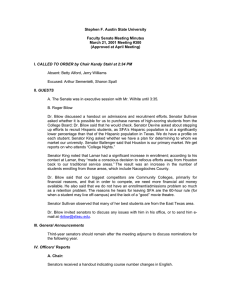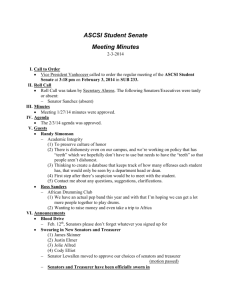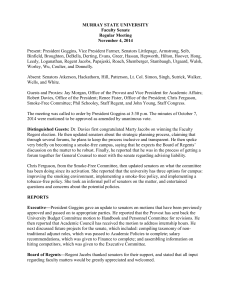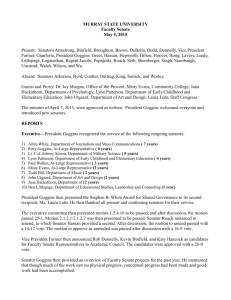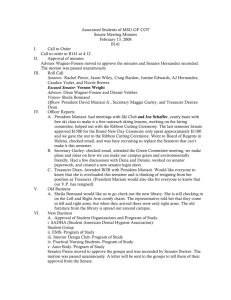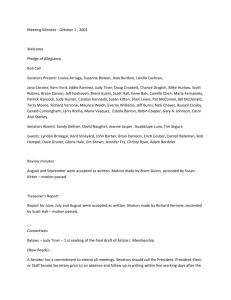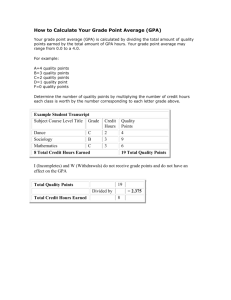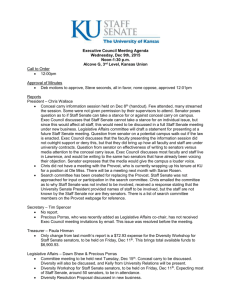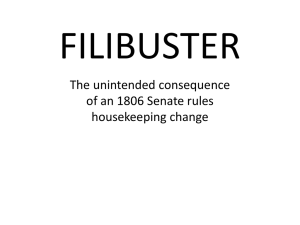Tuesday, March 19, 2013 - University of Mississippi
advertisement
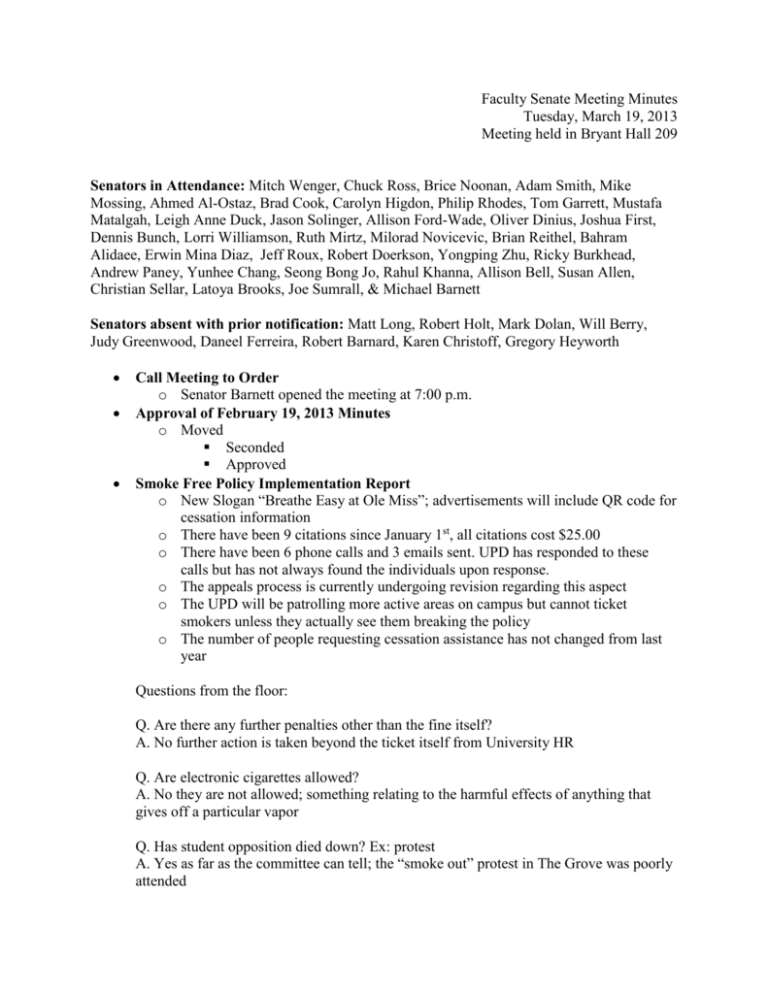
Faculty Senate Meeting Minutes Tuesday, March 19, 2013 Meeting held in Bryant Hall 209 Senators in Attendance: Mitch Wenger, Chuck Ross, Brice Noonan, Adam Smith, Mike Mossing, Ahmed Al-Ostaz, Brad Cook, Carolyn Higdon, Philip Rhodes, Tom Garrett, Mustafa Matalgah, Leigh Anne Duck, Jason Solinger, Allison Ford-Wade, Oliver Dinius, Joshua First, Dennis Bunch, Lorri Williamson, Ruth Mirtz, Milorad Novicevic, Brian Reithel, Bahram Alidaee, Erwin Mina Diaz, Jeff Roux, Robert Doerkson, Yongping Zhu, Ricky Burkhead, Andrew Paney, Yunhee Chang, Seong Bong Jo, Rahul Khanna, Allison Bell, Susan Allen, Christian Sellar, Latoya Brooks, Joe Sumrall, & Michael Barnett Senators absent with prior notification: Matt Long, Robert Holt, Mark Dolan, Will Berry, Judy Greenwood, Daneel Ferreira, Robert Barnard, Karen Christoff, Gregory Heyworth Call Meeting to Order o Senator Barnett opened the meeting at 7:00 p.m. Approval of February 19, 2013 Minutes o Moved Seconded Approved Smoke Free Policy Implementation Report o New Slogan “Breathe Easy at Ole Miss”; advertisements will include QR code for cessation information o There have been 9 citations since January 1st, all citations cost $25.00 o There have been 6 phone calls and 3 emails sent. UPD has responded to these calls but has not always found the individuals upon response. o The appeals process is currently undergoing revision regarding this aspect o The UPD will be patrolling more active areas on campus but cannot ticket smokers unless they actually see them breaking the policy o The number of people requesting cessation assistance has not changed from last year Questions from the floor: Q. Are there any further penalties other than the fine itself? A. No further action is taken beyond the ticket itself from University HR Q. Are electronic cigarettes allowed? A. No they are not allowed; something relating to the harmful effects of anything that gives off a particular vapor Q. Has student opposition died down? Ex: protest A. Yes as far as the committee can tell; the “smoke out” protest in The Grove was poorly attended Q. Why are tobacco free products not allowed? A. One of the members on this committee suggests that they still harm people who are in the presence of the vapor in them *Senator suggests that the electronic cigarettes make the policy appear as a joke** - policy does not specifically reference electronic cigarettes but an FAQ page at the end of the policy states they are not allowed - individuals smoking can be ticketed if they are in their car - electronic cigarettes make it more difficult for UPD to ticket Senate Committee Reports Executive Committee o No Report Academic Affairs o Last attempt to solicit feedback about grade appeals, repeating courses, and grade forgiveness; other than policy changes that have been previously described o Course repeating is up to 4 courses or a maximum of 12 hours; a single course can only be repeated twice at a lower level Questions and Comments - One senator’s colleague was curious as to why UM chose the most lenient policy rather than a rigorous policy compared to peer institutions One concern was expressed that moving to “B-“ rather than “C-“ seemed overly drastic Q. Why are we creating a policy based on an outlier instead of being consistent with the majority of majors offered? A. Dr. Eftink clarified: currently the university does not have a policy that limits the number of times that a student can repeat a course; therefore, one reason for a policy is to give the university a means of regulating. Another issue is the difficulty of enforcing specific course-related grade pre-requisites. In the repeating policy, both attempts count toward a student’s GPA. Q. Should faculty legislate student behavior by trying to give students an opportunity that has had a bad semester? A.One senator pointed out that the faculty should not attempt to legislate all student behavior - Provost Stocks commented that this particular issue primarily arose as a result of the +/- grading system going into effect when many courses had a “C” pre-requisite and it was not certain how to handle “C-“ grades Q. How does this impact retention? A. No one is certain because there is not any data yet Q. If we, as a faculty, have any type of repeating policy and students know the policy exists will they plan/calculate how to retake courses to improve their GPA? A. Not Answered Q. Is this about managing seats better? A. It is primarily about informing students on what happens if they make a “C-“ Academic Support o No Report Finance o No Report University Services o No Report Parking committee meets Thursday Governance o Update on Ombudsman All Senators received report All Senators received draft resolution o What will office do? Help individuals and groups determine options to resolve conflicts, issues, or concerns Bring systematic concerns to the attention of the organization for resolution Conduct formal inquiry in cases where existing formal channels have failed to satisfy the “client” o Key Issues Does not have to be utilized Does not alter or replace existing formal mechanisms o How does an Ombudsman help? Prove a confidential “sounding board” Suggest ways of communicating with the chair to resolve the problem If necessary and appropriate, investigate the complaint and file a report with the Chancellor and Chair o Plan The senate will outline characteristics that Ombuds office should have and the roles that it will fulfill Suggest that the Chancellor form an Ombuds Chair to explore, develop ways of communicating, and resolving problems Present proposals to Senate and Chancellor for considerations ** Resolution Moved and Seconded ** Q. Does this include students? A. Yes -Suggestion made to leave this decision to the committee to study more in-depth Q. Do other institutions/SEC schools make the Ombudsman available to everyone on campus? A. There is a list of approximately 357 institutions with Ombuds offices (Univ. of Alabama has 3 or 4 that are full-time) Q. What is the reasoning for including students? A. Currently, the university has an office that handles student issues; however, when the Ombuds office opens if this resource is no longer available that is why- some institutions cover students some do not Q. Why are more students other than student workers included? A. Other schools deal with academic issues not just work related issues Q. What are the current resources available for students? A. “Student Advocate” position in the Vice-Chancellor for Student Affairs Office Q. What SEC schools include students and what data do we have on these schools? A. If this office serves students we feel other universities which include students have full-time Ombuds; the answer naturally depends on the size of school and workload – the office is not designed to be an advocate they are designed to be impartial** Motion: to amend the resolution 21-13 (passed)** Will read “university employees” instead of “faculty, staff, members, and student employees” Resolution passed unanimously Q. Does a student receiving awards or funding count as a student employee? A. Scholarship: No; Assistantship: Yes Old Business Update on Second Bachelor’s Degree Task Force (Dr. Robert Doerksen & Dr. Adam Smith) The University of Mississippi may confer a second bachelor’s degree upon either its graduates or those of another institution when a student has completed the specific course requirements for the second degree as defined by The University of Mississippi. In addition to the credits used for the first degree, the candidate for the second bachelor’s degree must complete at least 30 semester hours in residence from the school or college recommending the degree, with a minimum 2.00 GPA for those courses. o This has now been approved by the Undergraduate Committee o Approved by the Council of Academic Administrators as well New Business Revised Policy of Selecting a Major o Proposal to regulate that students must have a GPA of at least a 2.0 or above to change their major o Multiple schools currently have a policy enforced; the policy would be campus wide and academic deans may make exceptions on their request Q. How many students have more than 45 hours and less than a 2.0? A. Approximately 1200 students fall into this but only 50 of those students had a major of undecided – students will be allowed to register after being advised with encouragement to increase GPA Q. Can a student switch from a major to undecided? A. That is not a major. Deans have the administrative discretion to allow a case-by-case basis Q. What is the purpose of having a 2.0 to swap majors? A. Several colleges within the university already have this policy enforced; the College of Liberal Arts wanted to relieve some of the responsibility being placed on them currently because they are in a “catch-all” state Q. Could poorly performing student be trapped in a major? A. Yes Q. What happens if a student gets above 45 hours, is undecided, and earns a 1.9 in that semester? A. The student will be trapped—catch 22 situation. The only solution would be to place that student within “General Studies” One senator suggests that the Senators receive more guidance in the future regarding issues that should be discussed with their colleagues The Senate Chair asked that the Senators remind their departments that next year’s Senate representatives need to be elected by the end of April Meeting Adjourned: 8:20 p.m.
